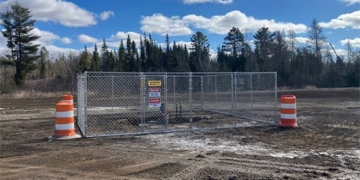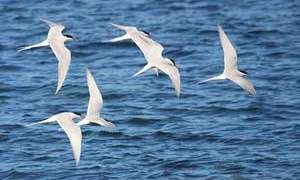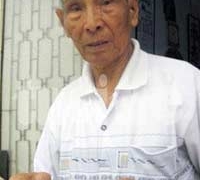The Qingming Festival is particularly important for descendants to show their filial piety towards their ancestors and grandparents. So, when is the Qingming Festival in the Year of the Cat 2023?
Understanding the Qingming Festival
1. Significance of the Qingming Festival
With the principle of “drinking water, remembering its source,” the Qingming Festival has long been an important and sacred holiday deeply rooted in the consciousness of the Vietnamese people.
Although Qingming is not a major festival, it is closely associated with the ethics and duties of Vietnamese people—the duty of descendants to remember the contributions of their ancestors and the predecessors. This is indeed a day for collective ancestral worship, allowing people to express their gratitude and repay the kindness of their forebears.
Qingming is the fifth节 (solar term) in the “Twenty-four Solar Terms” and is considered an annual festival by Eastern cultures. The Qingming Festival occurs 45 days after the Spring Equinox. Literally, “qing” means clear, and “ming” means bright. After the Spring Equinox, the spring drizzles cease, and the sky becomes clear and bright, signaling the arrival of the Qingming Festival.

The Qingming Festival begins around April 4 or 5, after the Spring Equinox.
Traditionally, Qingming lasts from around April 4 or 5 until approximately April 20 or 21 in the Gregorian calendar. This year, Qingming starts on April 5, 2023 (the 17th day of the 2nd lunar month) and lasts until May 5 (the 17th day of the 3rd lunar month). According to tradition, the days of Qingming are the time to remember one’s roots; many families engage in tomb sweeping and prepare special foods like “bánh trôi” and “bánh chay.”
Our ancestors chose Qingming as the day to cut grass on the tombs and add soil (tomb sweeping). This day typically features warmer weather with more rain, leading to better growth of grass and plants covering the graves, which can cause erosion, necessitating mowing and adding soil to the tombs.
While visiting the tombs during Qingming to honor their ancestors and deceased relatives, people also enjoy the lush scenery, thus the term “踏青” (踏 meaning to tread and 青 meaning green). Nguyễn Du famously wrote:
Qingming in the third lunar month
Ceremony is tomb sweeping, celebration is踏青
2. Origins of the Qingming Festival
The Qingming Festival originated in China. According to legend, during the Spring and Autumn period, King Wen of the Jin state was exiled due to political turmoil and sought refuge in the Qi and Song states. At that time, a wise man named Jie Zituo assisted the king with strategies. One day, while fleeing, Jie Zituo ran out of provisions and secretly cut a piece of his own thigh to cook for the king. Touched by this act, the king expressed profound gratitude.
Jie Zituo served King Wen of Jin for nineteen years, enduring many hardships together. Later, when King Wen regained his throne, he generously rewarded his loyal subjects but forgot about Jie Zituo’s contributions. Jie Zituo held no resentment, believing he had fulfilled his duty and owed no debt of gratitude. Thus, he returned home and took his mother to the mountains of Dienshan to live in seclusion.
Eventually, King Wen remembered and sent people to search for Jie Zituo. However, Jie Zituo refused to leave Dienshan to accept his rewards. King Wen ordered the forest to be set on fire to force him out, but Jie Zituo remained defiant, and both he and his mother perished in the flames.
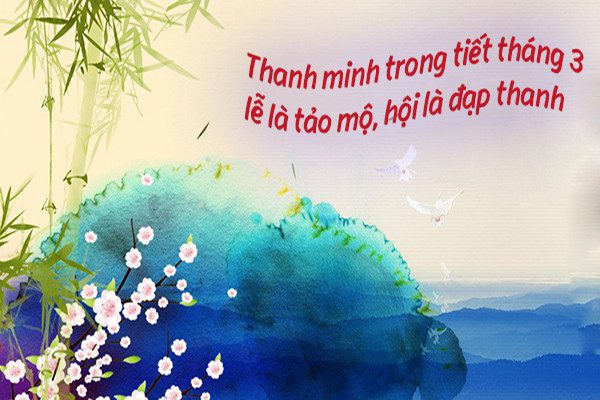
The king, saddened by this tragedy, established a shrine and decreed that the people should refrain from lighting fires for three days, consuming only cold, pre-cooked foods in remembrance (from the 3rd to the 5th day of the 3rd lunar month). Since then, the 3rd day of the 3rd lunar month has been recognized as the Cold Food Festival, honoring the nurturing contributions of those who have passed.
Since the Ly dynasty, the Vietnamese have adopted the Cold Food Festival, but its meaning has evolved and become rich in traditional color, aligning with the psychology and daily life of the Vietnamese people. During the Cold Food Festival, Vietnamese people do not abstain from fire; cooking continues as usual, but they use “bánh trôi” and “bánh chay” as symbolic cold foods. Therefore, the Vietnamese also refer to the Cold Food Festival as the bánh trôi – bánh chay Festival.
The Qingming Festival is intertwined with the ethics and duties of Vietnamese people—the duty of descendants to remember the contributions of their ancestors and the predecessors.
This is a day for collective ancestral worship, allowing people to express their gratitude and repay the kindness of their forebears.
Throughout the year, descendants who work far from home often return during this time to honor their ancestors and reunite with family. Generally, during this period, the living host family gatherings, conduct tomb sweeping ceremonies, visit, and clean the graves of their ancestors.
The primary task involves clearing the weeds covering the graves and adding new soil to enrich the graves, as spring’s drizzle can promote the growth of wild plants.
It is also essential to check for termite damage or any small animals burrowing into the graves; if so, immediate action is necessary as this could pose a danger to the feng shui of the resting place.
Simultaneously, a ceremony is held to invite the deceased to return home for a meal with their descendants. The living remember and reflect on the good qualities of their ancestors with utmost sincerity.
When conducting the Qingming ceremony, it is crucial to prepare meticulously. Aside from sincerity, one must also know the necessary offerings and, most importantly, how to prepare the Qingming offerings correctly.
Offering at home and at the tomb require different preparations and prayers, so the host must pay attention to avoid confusion. For detailed guidance, readers are invited to refer to the articles on Tomb Sweeping Prayers for the Qingming Festival and Qingming Prayers at Home.
The Qingming Festival is essentially one of the 24 solar terms of the year. It lasts from April 4 or 5 to April 20 or 21. The term Qingming signifies a time of clear and bright weather, with a fresh and pure atmosphere.
3. When is the Qingming Festival 2023?
Maintaining the customs of our ancestors is highly valued by many people, who are conscious of preserving them. Therefore, many are curious about the date of the Qingming Festival in 2023. In fact, the date of the Qingming Festival does not have a fixed date. Thus, determining the timing can be somewhat challenging.
According to the lunar calendar, the Qingming Festival usually falls between April 4 or 5 (after the Spring Equinox) and ends around April 20 or 21 of the Gregorian calendar each year.
In 2023, the Qingming Festival will occur on Wednesday, April 5, 2023 (the 15th day of the 2nd lunar month, Year of the Cat).
The Qingming Festival is a humanistic and humanitarian holiday, primarily focused on remembrance. Therefore, there is no need to emphasize lavish offerings; excessive spending on gold paper and burning paper money is not only wasteful and environmentally harmful but also lacks spiritual significance. Comforting the living and remembering the deceased is rooted in thoughtfulness, sincerity, and respect.
4. Tomb Sweeping Tradition
For the Vietnamese, the Qingming Festival is an occasion for descendants to turn towards their ancestors and roots. Regardless of where they are, on the 3rd day of the 3rd lunar month, people make an effort to return home to conduct tomb sweeping and gather around the family meal. The graves are cleaned and enhanced with new soil, reflecting the virtues of the living for those who have passed.
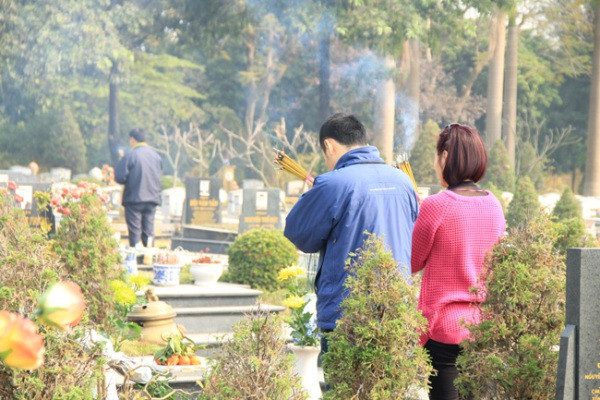
For the Vietnamese, the Qingming Festival is an opportunity for descendants to remember their ancestors.
The main task of tomb cleaning is to tidy up the graves of ancestors to keep them clean. On the occasion of the Qingming Festival, people bring shovels and hoes to fill the graves, clear away weeds, and remove any wild plants that might cover the graves, as well as to prevent wild animals like snakes and rats from digging holes and nesting, which they believe can disturb the souls of the deceased. Afterward, the tomb cleaner lights incense, burns offerings, or places additional flowers for the souls of the departed.
On Qingming Festival, the cemetery becomes crowded and lively. The elderly pray to their ancestors at the gravesite. Children also accompany their parents or grandparents to clean the graves, first to learn about their ancestors’ graves, and second to instill in them a sense of respect for their ancestors through this tradition. Those who work far away often return at this time (sometimes a day or two earlier for various reasons) to clean their ancestors’ graves and reunite with their families.
In addition to well-cared-for graves, there are also unvisited graves without caretakers. Visitors often place a stick of incense for these neglected graves as well.
Besides the above customs, Vietnamese people also prepare sticky rice cakes and plain cakes to offer incense, after which the whole family gathers to enjoy the rich flavors of these delicacies.
The Qingming season also marks the beginning of warmer weather, with trees flourishing and many flowers blooming, making it an ideal time for outings and sightseeing.
5. What offerings are made during the Qingming Festival?
The offerings during Qingming Festival consist of two parts: offerings to ancestors at home and offerings at the graves. Therefore, it is essential to remember that preparations for Qingming offerings should include these two types. Additionally, the offerings at the graves include offerings to the local deity and earth spirits.
Preparing offerings for Qingming at the grave
Typically, preparations for the Qingming offerings begin 1-2 days in advance, as it is customary to clean the graves and offer prayers early in the morning. The offerings for Qingming at the grave should include:
- Colored paper, incense, candles, paper money, gold and silver offerings, and paper clothes…
- Various types of cakes and fresh fruits
- Betel nuts, wine
- Clean water
- Some dishes depending on each family’s circumstances, but vegetarian options are preferred
A set of three living (tam sinh): This set, used for offering during major festivals in the past, consisted of three animals: a cow, a pig, and a goat. However, nowadays, depending on local customs—be it Cao Bang, or the Qingming traditions of the Tay, Nung, Kinh, Hoa, or Vietnamese people—and family circumstances, this offering may or may not be prepared.
These offerings should be neatly arranged on a plate and placed on a clean surface before performing the ritual. It is important to have a separate offering for the local deity at the burial site, including incense, betel nuts, money, and paper clothes…
Preparing offerings for Qingming at home
What to offer at home during Qingming depends on each family’s circumstances, which may include a tray of cooked food or fresh fruits… alongside essential offerings like paper money, incense, betel nuts, and clean water.
Depending on the family, they may prepare a complete offering tray with sticky rice, boiled chicken, or pork, bamboo shoot soup, stir-fried dishes… Or, the Qingming offering may simply involve lighting incense with fresh fruits, tea, and cigarettes… to inform the deceased ancestors about the Qingming Festival and commemorate them.
Note: The fruits must be fresh, and especially when choosing flowers, it is best to avoid overly colorful arrangements and select according to the deceased’s preferences or relationships. When offering flowers to elders without knowing their preferences, it is advisable to choose white or yellow chrysanthemums. If offering to peers, besides white or yellow chrysanthemums, one may choose lilies or carnations.
6. Precautions to avoid bad luck during Qingming Festival
When visiting graves during the Qingming Festival, there are several precautions to be aware of to avoid misfortune:
When passing by someone else’s grave, do not step on or disturb the offerings of others, as this may bring bad luck, especially for children and young people.
Women who are menstruating, pregnant, or individuals suffering from cold or rheumatism should refrain from visiting graves due to the cold atmosphere and negative energies present there.
Since the tomb cleaning is a time for family gatherings, it is common to take commemorative photos. However, this practice is not encouraged in cemetery areas, so photography should be limited.
When cleaning the graves, it is important to thoroughly clean the area and check the condition of the grave to prevent rodents or snakes from entering.
Avoid discussing or pointing at other people’s graves to prevent bringing misfortune upon oneself, as this is also a way to show respect for the deceased.
Prayer for Ancestors on Qingming Festival
Prayer for Qingming at the Grave
The offerings for tomb cleaning during Qingming usually include: incense, candles, betel nuts, paper money, meat (pork hock, boiled chicken, or a piece of lean pork), and fresh fruits.
We bow to the nine directions of Heaven, the ten directions of the Buddhas, and the Buddhas of the ten directions.
We respectfully invite the spirits of the ancestors… (father, mother, or ancestor…).
Today is the day…
On the occasion of:…
We, the faithful, …
Residing at:…
We and our whole family, in gratitude for the great merits and high virtues established by… sincerely remember the spirits in these desolate places, offering incense, betel, tea, fruits, and lighting a stick of sincere incense before the grave, respectfully inviting the spirit of…
We request permission to repair the grave, enhance the surroundings, and fortify the path for the spirits to ensure stability. With the blessings of the Buddha and saints, and the protection of heaven and earth, we hope for peace, tranquility, and prosperity. We, the descendants of …, vow to accumulate virtues and do good deeds, helping the poor and needy, being filial to our ancestors, to gain blessings towards our ancestors.
We humbly request the sacred to witness, accept our offerings, and bless our descendants, surveying our home. Protect us from disasters, grant us wealth and prosperity, bringing good fortune and warding off evil. May our family thrive, our descendants prosper, and may we all receive the blessings of the Buddha and saints.
We offer our humble offerings with sincere hearts, respectfully requesting your witness.
After completing the prayer, wait until two-thirds of the incense has burned, at which point everyone proceeds to offer gratitude, burn offerings, receive blessings, and return home to perform rituals for the family deities and ancestors.
Prayer for Qingming at Home
Depending on each family, a meal can be prepared with sticky rice, boiled chicken, or pork, bamboo shoot soup, stir-fried dishes, or simply light incense with fresh fruits, tea, and cigarettes… to inform the ancestors about the Qingming Festival.
The head of the household should dress solemnly, stand before the altar, light incense, and candles, and then pray:
Namo Amitabha Buddha!
We bow to the nine directions of Heaven, the ten directions of the Buddhas, and the Buddhas of the ten directions.
We bow to our ancestors, both maternal and paternal sides of the family…
We bow to the ancestors and spirits at home.
Today is the day… month… year…
We hold the offering for… (name), aged…, born in the commune…, district…, province… along with the entire family, bowing before the ancestral altar.
Respectfully inviting the local deity to come and bless us.
We humbly offer: betel nuts, wine, tea, paper money, fruits, and heartfelt gifts on the occasion of Qingming, respectfully inviting the spirits of ancestors, relatives, and family members to witness and accept the offerings.
We sincerely request our ancestors, both maternal and paternal, to bless and protect our family, ensuring peace and prosperity, with pleasant weather throughout the year. May good fortune come, and misfortune be warded off, allowing our family’s endeavors to go smoothly and encounter much luck.
We respectfully present our offerings with sincere hearts, humbly asking for the ancestors’ witness to the dedication of all family members.

















































